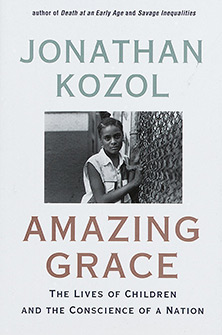Where to start? I could have begun
by explaining how these loans had originally been taken out by unelected
dictators who placed most of it directly in their Swiss bank accounts, and ask
her to contemplate the justice of insisting that the lenders be repaid, not by
the dictator, or even by his cronies, but by literally taking food from the
mouths of hungry children. Or to think about how many of these poor countries
had actually already paid back what they’d borrowed three or four times now,
but that through the miracle of compounded interest, it still hadn’t made a
significant dent in the principal. I could also observe that there was a
difference between refinancing loans, and demanding that in order to obtain
refinancing, countries have to follow some orthodox free-market economic policy
designed in Washington or Zurich that their citizens had never agreed to and
never would, and that it was a bit dishonest to insist that countries adopt
democratic constitutions and then also insist that, whoever gets elected, they
have no control over their country’s policies anyway (3)
This
quote, and the next quote to follow, are from the beginning of the chapter when
Graeber described an encounter he had with a so-called activist attorney. The
quotes presented here will be in reverse order, a deliberate choice of mine to
aid in my analysis. In her blog “Debt and ‘Morality’” Deirdre quotes the same
paragraph and begins her analysis by calling this economic colonialism. I both
agree and disagree with this label. I have found that nowadays people often use
qualifiers before leveling a critique of a system and labeling it colonialism.
I think this has to do with the mindset that colonialism is a part of the “colonial
period” and the “colonial period” is over. However, Graeber’s excerpt above
shows that colonialism is not over,
not even close. So yes, it is economic colonialism, and the reason it is
economic colonialism is because it is simply colonialism; the economic manipulation and domination is a given. This
is a point I feel Graeber could have made a bit more strongly. A bit later on
in the chapter he does note that un-coincidentally many of these “third world”
nations that are falling into this debt trap are ones that were ‘former’
colonial entities (5). My critique is that he could have been more explicit:
these are not simply former colonial entities, these are
countries that are still fighting colonialism to this day!
In “TheWeapon of Theory” Amilcar Cabral offers definitions of colonialism and
neocolonialism. He states:
the first [form of imperialist
domination] is direct domination, by means of a power made up of people foreign
to the dominated people (armed forces police, administrative agents and
settlers); this is generally called classical
colonialism or colonialism. [The
second form] is indirect domination, by a political power made up mainly or
completely of native agents; this is called neocolonialism (7) [emphasis Cabral's]
The first definition is one that
most people are familiar with and the one that they think of when they hear the
word “colonialism”. Unfortunately, the second form of imperialist domination,
and the overall nuances of colonialism, is less familiar to most. I would make
the argument that neocolonialism is simply a branch of colonialism, and so a
colonized entity can have elements of both forms of domination. In truth, in
order to have the latter the first must be in place. For the only reason that a
native force would engage in this form of imperialist domination is because
they have identified with their foreign colonizers and are thus doing the work
of their colonizers. Do we not see, then, that the unelected dictators that
Graeber mentions are simply doing the work of the empire? I will quote another
passage of Cabral, one that is more obviously related to what we are
discussing:
The so-called
policy of ‘aid for undeveloped countries’ adopted by imperialism with the aim
of creating or reinforcing native pseudo-bourgeoisies which are necessarily
dependent on the international bourgeoisie, and thus obstructing the path of
revolution (9)
Colonizers are like viruses. They infect the host by
implanting their own ideologies and multiplying. Because this is the tactic,
the original colonizers need not still remain in the host, for they have
already replicated and turned native bodies into mirror-images of themselves.
On page two Graeber notes that:
The IMF then stepped in [to the
Third World debt crisis] to insist that, in order to obtain refinancing, poor
countries would be obliged to abandon price supports on basic foodstuffs, or
even policies of keeping strategic food reserves, and abandon free health care
and free education; how all of this had led to the collapse of all the most
basic supports for some of the poorest and most vulnerable people on earth. I
spoke of poverty, of the looting of public resources, the collapse of
societies, endemic violence, malnutrition, hopelessness, and broken lives.
After reading these two quotes I
would be positively shocked if even a moderately-informed person would try to
argue with me as to whether or not colonialism still exists and is showing
itself through the “Third World debt crisis”. This is how the virus of
colonialism works! Do you not see how in order to “fix” the debt, the IMF is suggesting
that forms of socialized structures must be abandoned and that these nations
most adopt “democratic constitutions” (3). In this way, democratic
constitutions=Capitalist constitutions. The virus eradicates what was once in place
and replaces it with its toxicity. Look at the Tonton Macoutes in Haiti for
example. Native forces? Perhaps. They were native forces trained by US
military, and funded by the US government. This is how modern imperialist
domination works. It creates particular rules concerning debt, enforces these
rules in inhumane ways, and uses the debt leverage as a way to further erode “third
world” nations.
